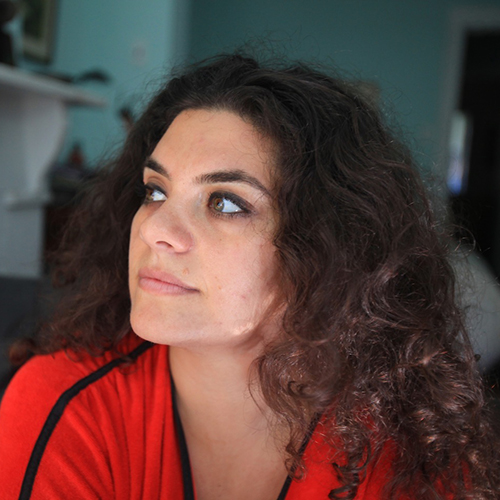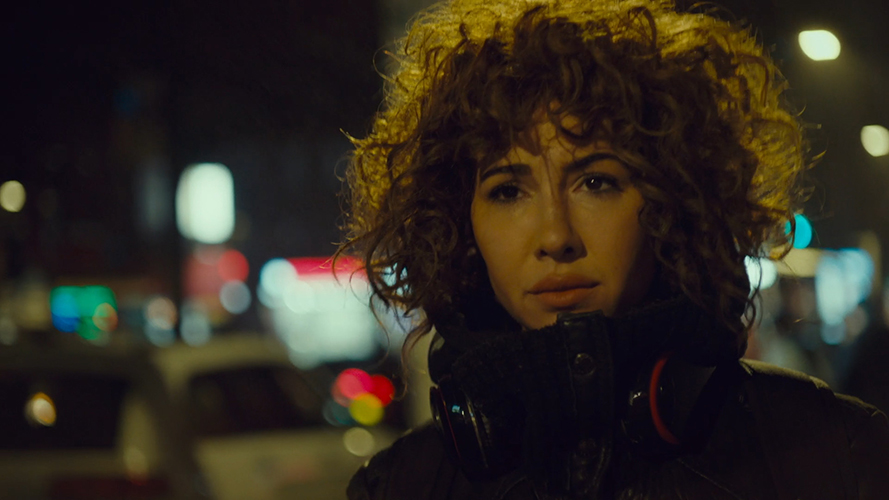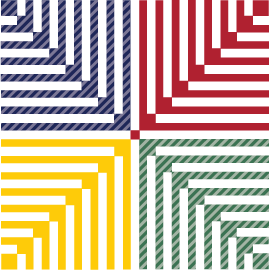

Rosa (2020, 23 minutes), a narrative short written and directed by Suha Araj, is about a florist who does what she has to do. This narrative short packs a punch emotionally and explores the intersectionality of the immigrant experience.
We spoke with Araj about her newest film, her experience as a filmmaker, and what it means to share authentic narratives.


BPFF: How has COVID-19 and the current climate in the US regarding social justice impacted promoting Rosa?
SA: It’s been hard, because it’s not a time where you feel like you want to promote anything. It’s also a time when you want to talk to people—not only post—about what is happening. How can you use your voice in the most effective way? I came to filmmaking because I didn’t like the representation that’s out there, and I felt that I wanted to have a hand in creating representations that felt more authentic.
The most rewarding part of filmmaking is being able to sit with the audience and watch them take in the film and see what they feel and what they connect with. That’s so much harder to do virtually, even though it’s still happening in its own little way. But meeting people [at an in-person screening] and these long-term friendships that are formed—that part is missing.
I also think maybe there’s a wider reach, and more people are seeing it than would have been able to [in a pre-pandemic world]. I feel a little silly if I announce, “Hey Rosa won this” or “We’re screening here.” Then I notice people are really happy, which makes me feel good, but every time I post right now, there’s a hesitation. I’m feeling more internal than external, and I’m sure many people are. It’s also a time when we need art and stories and connection more than ever.
BPFF: In an earlier interview you said, “Just watching the media that was out there representing Arabs, I didn’t feel like it was representative at all. I felt like it was false; it really didn’t have to do with my experiences. So my real motivation to come into film was to reflect the experiences that I was not seeing on screen.” Do you feel that Arab media, specifically cinema, is more representative now? If yes, why?
SA: I was curating with the Arab Film Festival in San Francisco from 2002 to 2008/9. I don’t know if I’m more involved or I’ve seen more cinema, but yes, I think there’s more out there from Arab creators and from more people who feel exactly like I do. Their approach to the filmmaking, the types of films they chose to make—everyone is different. There are directors putting super contemporary work out there, especially out of Palestine. I’ve discovered people I don’t even know. The Present was so moving and well done—I questioned, “How do I not know Farah [Nabulsi]?” It’s an example where in one of these situations [an in-person festival or screening], we would have been able to connect.
I’m aware of more Arab filmmakers just because I’m in it. I don’t know what “mainstream” looks like—if we’ve made a dent, I don’t know yet.
BPFF: Who are the filmmakers whom you admire in this space?
SA: Any contemporary Arab cinema I’ve seen that I feel is telling our story. I’m collaborating with other Arab-Americans like Darine Hotait and Amber Fares; we’re working together on a series. In talking to people through that and doing table reads, I’m seeing other people within the industry and learning their experiences and how they’ve had to position things. I’ve been talking to Betty Shamieh, who’s an amazing playwright. I love Larissa Sansour’s In Vitro. The fact that she made it before all this, the way Palestine has always existed—her film is so brilliant and encompassing. When I get to see Larissa, it’s so wonderful.
I imagine the kind of work people are doing is pushing things forward and telling the story in the way that is authentic to us. I’m hoping those voices can reach far and wide.
BPFF: You’ve said before, “It’s never someone’s Plan A to leave home.” This idea of resilience and what it takes to start over and what that means for the next generations is fascinating and often alien to some American audiences. How does this narrative come into play in your own work, if at all? What does generational legacy mean to you?
SA: Something that was hugely important for me with Rosa is making the story wider than just our Palestinian story or just our Arab story and finding those connections with other immigrants. The experience of having to leave your country is universal to so many places that have suffered and not just Arabs. Who suffered the most is not the point. So many people have been treated so awfully and are just surviving, and we don’t hear about it. I think there are so many emotions that are similar. That was really my starting point for Rosa. It was important to me to have a lead character from a different community. The bigger vision of this is that those emotions are universal.
Yeah sure, if you’re a teenager and you want to get out, you might try something new. I grew up in Ohio; I couldn’t wait to leave home. I need home—I need my people; I need to go back there; I need to check in. I don’t think anyone really wants to leave home. That’s a key line in Rosa. My American friends who watched it—that was the moment in the film where they paused. I don’t think they wouldn’t know that [that people don’t want to leave home], but I don’t know if they’ve really thought about it. For a wider audience, I don’t know if you’re thinking of immigrants in that way. I think it’s another side to the story that we’re not talking about. What are we doing in this country to so many places that is forcing people to need to leave home? Which is the underlying message of Rosa as well.
This is the most political film I’ve made so far, and I still wanted to focus on the emotions of the experience. By nature of making the main character Iraqi, I was saying, “Hey, remember Iraq?”
When I did my first Q&A, I was nervous. In that experience, I realized that I just made a really political film. I don’t think I realized it until I was answering a question in that moment, until the film was out in the world.
Being Palestinian is inherently political. You’re born radical without even trying.
BPFF: You’ve said your inspiration for Rosa was from an installation for a Dia de los Muertos exhibit called “Buried in Michigan” where you thought about your grandfathers and where they were buried. Did most people want to be buried where they lived or where they were from?
SA: People knew the answer, which is what surprised me, and maybe knowing the answer comes with a luxury. I never had an answer.
BPFF: This film, like most films about the immigrant experience, exhibits the incredible work ethic and “what it takes” to make it in their “Plan B.” Why do you think this concept is so lost on many in spaces outside of art (legislation, development, etc.)?
SA: There does seem to be a lack of empathy. I think we otherize each other too. Immigrants who have been here longer sometimes discriminate against newer immigrants in every culture. I think it’s survival; I think everyone is trying to survive. You don’t have a choice.
For example, in the film, for Ali, he’s constantly put in compromised situations, and he has to stay above water. You have to survive so the other generations can think about thriving. Most people are surviving, and when your life depends on it, I feel like you do whatever you can, especially when you’re doing it for someone you love and your family.
BPFF: In a previous interview in advice to young filmmakers you said, “you really have to trust yourself and your experiences.” How did you learn to trust yourself, and did you make mistakes?
SA: The biggest mistakes I made were when I didn’t trust myself. No one is going to have the right answer for me. I didn’t go to film school. I can’t quote every Italian director and every French film. I don’t have that body of knowledge. It’s not my reference. My reference isn’t cinema. My reference is the experiences that I’m living and watching the people I love live. That’s where I start from for films. It’s taken me a while to own that.
I’m not saying I know what I’m doing; I’m just saying I’m trying to be true and authentic to the character and the choices they would make in those moments.
BPFF: Would you like to share any upcoming projects?
SA: Khsara has been my baby for 10 years. The prelude, The Cup Reader, was a fun film to make —people felt good watching it. I think Khsara will have the same vibe. I think it’s the time to do it. It takes place in the Palestinian diaspora in the US. It’s the story of a girl who’s figuring out how to make her own choices outside of the expectations, in a fun comedic way. Making Rosa versus making Khsara—it’s a much different feeling, but I think what we did with Rosa brought together friends. It [Working on Rosa] was mostly people of color, so it felt like a safe environment. I loved working in that way and hope to continue.
I’m working on a comedy series with Amber and Darine called Dearborn about an Arab-American artist who has been in New York for almost 20 years and moves back to Dearborn to run her dead friend’s tattoo parlor.
We’re developing Rosa into a series.
The Bowling Green film is super early development, but I’m excited about it. It’s a teen comedy in a biblical sense.
There are other collaborations, but those are the major projects coming from me at the moment.
BPFF: What would your dream project be if money, time, and citizenship were not obstacle?
SA: To be able to make Khsara. I don’t think the industry knows what to do with a Palestinian comedy. I think there have been Palestinian directors who have done it amazingly, and I’ve seen it more out of Palestine than the Americas. [My dream project would be] to make Palestinian comedy.
The dream is to be able to make the projects I’m working on. Rosa getting funded was a huge deal. I’m so grateful to Tribeca and Chanel for funding it.
I’m already making the projects I want to make. It’s just who’s going to support me.
BPFF: What story needs to be told right now that isn’t being told?
SA: I don’t know that stories aren’t being told or we’re not able to hear them—whether we’re not listening or we’re not accessing it. I think any story that connects us to our humanity through any emotion needs to be told. Every creator does that differently. There’s so much tragedy in the world. Yes, we need to know about that, and there’s ways to know about that, but I also want to hear the love stories and the beautiful stories and the stories of survival over generations. I want people to tell the stories that won’t leave them alone.
Rosa screens online October 16-25, as part of Shorts Series: Against All Odds. View the full festival program and buy tickets here.

